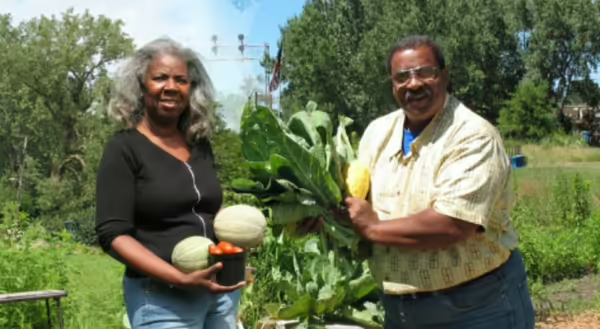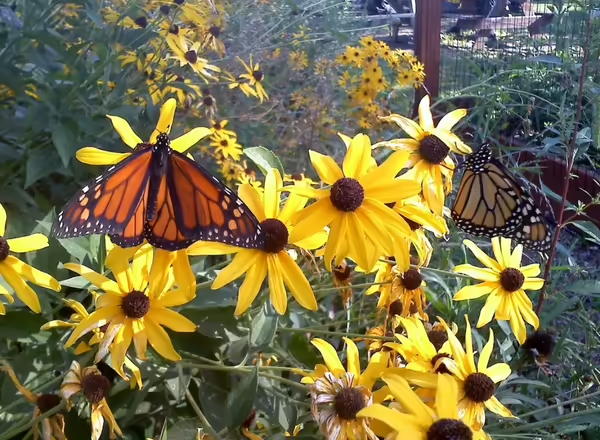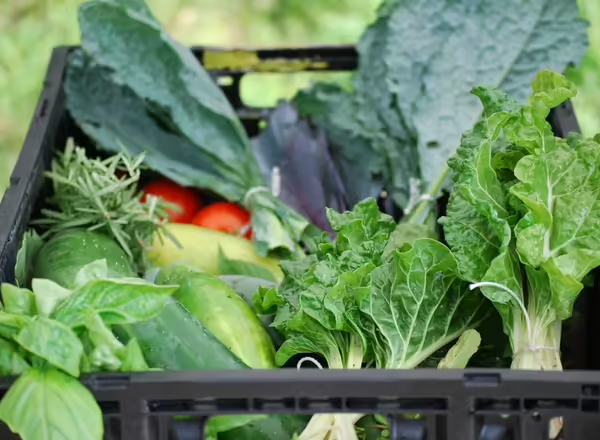
How an urban farm is healing history and feeding Chicago
In the heart of Chicago’s Fuller Park, a quiet revolution has taken root. Eden Place Farms stands as a sanctuary against the city’s enduring food desert — a growing testament to how vision, grit, and determination can transform even the most neglected urban landscapes.
For Michael Howard, founder of Fuller Park Community Development under which Eden Place operates, the work began as a project to clean up an illegal dumping site which became Eden Place Nature Center. Later it grew into a mission to reconnect his community to healthy food and a legacy of agricultural skill and pride often buried beneath a painful history for the city’s African American community.
From its simple beginnings as a community garden, Eden Place Farms has grown into an award-winning urban farm and learning center. But the farm is more than rich soil and green vegetables — it is a beacon for local residents, a living reminder that as they reclaim the land, they are also reclaiming the forgotten stories of those who worked the land before them.
The clean-up begins
Fuller Park is home to about 2,200 people — 83% Black, 3% white — according to the Chicago Metropolitan Agency for Planning. The majority of households (60%) are single-person households. Nearly half of the residents are 50 and older.
70% of Fuller Park households earn $25,000 or less, with a median income of $15,359, according to the 2018-2022 American Community Survey five-year estimates. Since 2000, the area has experienced a 35% decrease in population, compared to 6% loss in the City of Chicago.
Michael and others hope to reverse that trend, encouraging more businesses to invest in the area. For that to happen, the Fuller Park community needed to reclaim what was theirs, beginning with removing the 35-year blight on the community, a 3-acre illegal dump site whose toxic debris sometimes reached two stories high, filled with construction and household debris. The site had the highest levels of lead in the Chicago area.
“Illegal dumping endangers public health and can decrease surrounding property values,” and is punishable by fines and jail time, according to the City of Chicago website. “Discarded tires and other waste materials capture and hold rainwater. Standing water is a prime breeding ground for mosquitoes, which can carry West Nile Virus. In addition, discarded waste attracts rats and endangers children who play in it.”

Fuller Park is one example of environmental racism, “the disproportionate exposure to toxic and hazardous waste in low-income minority communities due to the inequality of environmental policymaking and laws. The collective exposure to these pollutions is at much higher rate than the surrounding white-affluent neighborhoods. Improper storage of hazardous waste, illegal dumping, and lack of education and protection for the workers all contribute to unjust and unequal environmental protection.” (Lake Forest College)
Initial attempts to clean the site were unsuccessful. “We would get it cleaned up, and it would just fill up again, almost like a transfer station,” Michael says.
“What are we going to do, Mr. Howard?” was the plea from the Fuller Park neighborhood.
Michael and his community of volunteers remained persistent. After three years, they had removed over 200 tons of concrete, wood, tires, and other toxic trash from the site.
Fresh soil, tons of it, transformed the space into a green landscape, Eden Place Nature Center. The Center provides green spaces to explore nature and offers educational training and workshops.
With one problem resolved, Michael moved on to another critical issue facing his neighbors, the availability of healthy food.
Tackling food access
The Fuller Park community has been a decades-long food desert. Michael was concerned about the limited access his neighbors had to healthy food. One Christmas, while caroling in a neighborhood building, he observed several cans of dog food in the kitchen of a senior resident who owned no pets. He realized they were eating low-cost dog food as their meals. Something had to change.
Eden Place began distributing food each Wednesday. The food provided some relief, but Michael was concerned about the highly processed food they were providing.
“I can’t keep giving folks this processed food,” he worried. “I want to give them real, live, fresh foods.”
Building a food hub for the community at Eden Place Farm
Following the construction of the nature center, an additional 3-acre property which once housed a truck repair facility became available for sale, but the group had no money, no credit, and no resources except for their determination and a dream to grow their own healthy food for their community.

As the saying goes, if there’s a will, there’s a way, Michael joked.
“I had the will to feed people, I had the will to continue to provide jobs for local residents. I had the will to continue to build something that has sustainability.”
So, Michael found a way. Over the next two years, Michael negotiated an affordable purchase price and secured a loan. Now the work to design the urban farm and learning center to complement the Nature Center began. He made connections with farm organizations, such as Illinois Farm Bureau, Illinois Specialty Crop Growers, and Illinois Extension, to learn as much as he could about farming.
Overcoming a shared painful history
Learning to farm was one challenge; the bigger challenge was instilling the desire to farm in his African American neighbors. They remembered the stories shared by their ancestors who were slaves and sharecroppers. “They’d tell me, ‘That’s work for somebody else; that’s not work for Black people anymore,’” Michael recalled.
Those who left the South in ‘The Great Migration’ didn’t want to talk about farming or talk about the plantation, Michael says. They escaped sharecropping and came north for a better life. “That hatred and that history of hurt our people suffered while working other people’s land is what keeps a lot of people even today from even dreaming about coming to our farm and doing work on any land.”
But Michael flips the narrative, telling his neighbors to take pride in the advancements America has made because of the work by Black Americans. “It was a terrible time, terrible event, but the skills and labor they provided allowed this country to grow into what it is today,” Michael says. “That is something we need to be proud of.”
So, in addition to providing food, Eden Place Farm hopes to reconnect people of the community back to the land.
“We are reeducating people to help them understand that the histories we had as farmworkers, field hands, and sharecroppers were valuable experiences that fed this country for almost 300 years,” Michael says. “Someone has to work the land if we’re going to eat. It behooves us to at least learn how to farm our own backyard.”
In 2024, they added a partner who shared their mission to provide fresh produce to their local communities and the underserved communities the Farm serves — IL-EATS. It’s working. Eden’s Place Farm is a modern food hub with growing plots, a learning center, and a food aggregation center.
How IL-EATS is planting seeds of growth
In June 2024, Michael’s contacts at the Illinois Farm Bureau told him about funding through IL-EATS. The United States Department of Agriculture established the Local Food Purchase Assistance program, which operates in Illinois as IL-EATS, to strengthen statewide food systems like those offered by Eden Place Farms. The program enhances access to fresh, local foods in underserved communities while it builds and expands market opportunities for local farmers. By creating partnership pathways between farmers and community partners, IL-EATS builds relationships that can continue beyond the term of the program.
It was the first seed money the organization had received.
“That [IL-EATS] contract gave us the lift that we needed to start building ourselves up as a sustainable farm,” Michael says.

“We want to create a new economic engine of local farmers selling their food.”
Over the winter of 2024, Eden Place Farm developed its expansion plan. They ordered more seed, purchased washing and distribution equipment, and expanded their staff, hiring four part-time staff to meet the increased demand for their contracted products. A new farm store opened in June 2025.
“The IL-EATS program and the income generated by it allowed us to improve a lot of our infrastructure to a more professional standard that we have long dreamed of,” Michael says. The funding allowed the farm to double its growing capacity from 1.5 to 3 acres of production.
“That expanded capacity was only possible due to the contracts that IL-EATS opened up for us,” Michael adds.
Eden Place Farm grows a variety of vegetables and cultural specialty crops to meet the needs of their neighbors, including sweet peas, basil, radishes, exotic beans, lettuce, Asian greens, collards, spinach, herbs, jalapeno, cilantro, and bok choy.
“Eventually, if you can find it in a grocery store, we want to grow it here,” Michael says.
The learning center not only trains urban farmers to grow fresh food, it also teaches them how to be profitable.
“I want a vehicle that can sustain itself, by not only growing more food for more families, but growing to provide more jobs for more residents,” Michael says.
You can find out more about Eden Place Farms on their website.